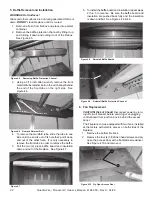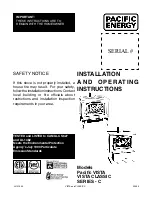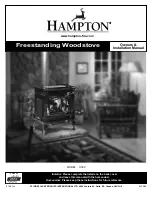
5. Chimney Fire
In the event of a chimney fire:
• Have the chimney and adjacent structure inspected by
qualified professionals. Hearth & Home Technologies
recommends that NFI or CSIA certified professionals,
or technicians under the direction of certified
professionals, conduct an inspection of the chimney
per the criteria in NFPA 211.
• Replace components of the chimney and fireplace
as specified by the professionals.
• Ensure all joints are properly engaged and the
chimney is properly secured.
WARNING!
Risk of Fire!
A chimney fire can perma
-
nently damage your chimney system. Failure to re-
place damaged components and make proper repairs
can cause a structure fire.
2. Firebrick
Your fireplace is lined with high quality firebrick, which has
exceptional insulating properties.
Do not operate the fireplace without bricks. Make sure
bricks are installed as shown in Section 4.
Do not use a grate; simply build a fire on the firebox floor.
4. Over-Firing Your Fireplace
DO NOT OVERFIRE THIS FIREPLACE UNIT
Attempts to achieve heat output rates that exceed design
specifications can result in permanent damage to the fire
-
place.
To prevent over-firing your fireplace. DO NOT:
• use flammable liquids
• overload with wood
• burn trash or large amounts of scrap lumber
•
permit too much air to the fire (leaving the door open)
• Immediately
close the door and air controls to reduce
air supply to the fire.
• If you suspect a chimney fire, call the fire department
and evacuate your house.
• Contact your local chimney professional and have
your fireplace and chimney inspected for any
damage.
Symptoms of over-firing may include one or more of the
following:
• chimney connector or fireplace glowing
• roaring, rumbling noises
• loud cracking or banging sounds
• metal warping
• chimney fire
What to do if your fireplace is over-firing:
• Do not use your fireplace until the chimney
professional informs you it is safe to do so.
• Hearth & Home Technologies WILL NOT warranty
fireplaces that exhibit evidence of over-firing.
Evidence of over-firing includes, but is not limited to:
- warped air tube
- deteriorated refractory brick
- deteriorated baffle and other interior components
3. Baffle and Blanket
Ensure correct baffle and baffle protection channel place
-
ment; replace baffle components if damaged or missing.
(Please refer to Section 4.)
NOTICE:
Firebox damage due to improper baffle placement
is not covered by warranty. Operate the wood burning
fireplace with the baffle in the correct position only. Not
doing so could result in:
• reduced efficiency
• overheating the chimney
• overheating the rear of the firebox
• poor performance
The baffle board must be in contact with the back of the
firebox. The ceramic blanket should lay on top of the baffle
board. The baffle protection channel should be in posi
-
tion and cover the front of the blanket and baffle board.
Figure 3.2 Baffle and Blanket Placement
Ceramic Blanket
Back of
Fire
box
Baffle Board
Baffle Protection
Channel in position
8
Quadra-Fire • Pioneer-II-C Owner’s Manual • 4184-900 • Rev C • 02/20









































